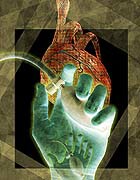- Could Your Grocery Store Meat Be Causing Recurring UTIs?
- Are You Making This Expensive Thermostat Error This Winter?
- Recognizing the Signs of Hypothyroidism
- 10 Strategies to Overcome Insomnia
- Could Artificial Sweeteners Be Aging the Brain Faster?
- Techniques for Soothing Your Nervous System
- Does the Water in Your House Smell Funny? Here’s Why
- Can a Daily Dose of Apple Cider Vinegar Actually Aid Weight Loss?
- 6 Health Beverages That Can Actually Spike Your Blood Sugar
- Treatment Options for Social Anxiety Disorder
Sophisticated Chest Scans May Raise Children’s Lifetime Cancer Risk


Children who have imaging tests for heart problems have higher cancer risks over their lifetime, a new study says.
These tests, which include cardiac catheterization and CT scans, are more complex than standard X-rays, and expose kids to higher doses of radiation than X-rays do, researchers at Duke University Medical Center explained.
“There are definitely times when radiation is necessary, but it’s important for parents to ask and compare in case you can avert potentially high-exposure procedures. Often, there are alternative or modified procedures with less radiation, or imaging may not actually be necessary,” study author Dr. Kevin Hill, an assistant professor of pediatrics in the cardiology division at Duke, said in an American Heart Association news release.
The study, published June 9 in the journal Circulation, involved 337 children under the age of 6. All had undergone surgery for heart disease at Duke. The researchers explained that they focused on children with heart disease because they generally have more imaging tests than other young patients.
Collectively, the children underwent nearly 14,000 imaging procedures.
The researchers assessed the children’s exposure to radiation. To do this, they examined medical records and determined which imaging tests were most commonly used. The amount of radiation that is absorbed by the organs during each test was calculated.
Based on the amount of exposure during each test, the investigators were able to estimate lifetime cancer risks.
The study revealed that for the average child in the study, the cumulative effective dose of ionizing radiation was relatively low. For some children with complex heart disease, however, cumulative doses of radiation were much more significant.
Lifetime cancer risk increases ranged from 0.002 percent for chest X-rays to 0.4 percent for CT scans and cardiac catheterizations. To put this into perspective, the researchers noted that although X-rays accounted for 92 percent of all imaging tests, more complex tests accounted for 81 percent of overall radiation exposure.
The study authors added that girls’ cancer risk is twice as high as boys’ because they are more likely to develop breast and thyroid cancers.
More information
The American Heart Association provides more information on radiation from heart imaging tests.
Source: HealthDay
Copyright © 2026 HealthDay. All rights reserved.










